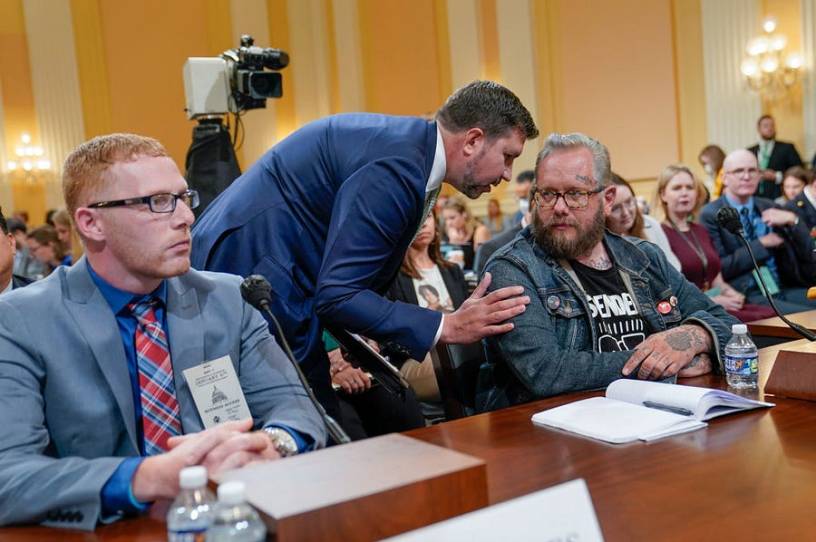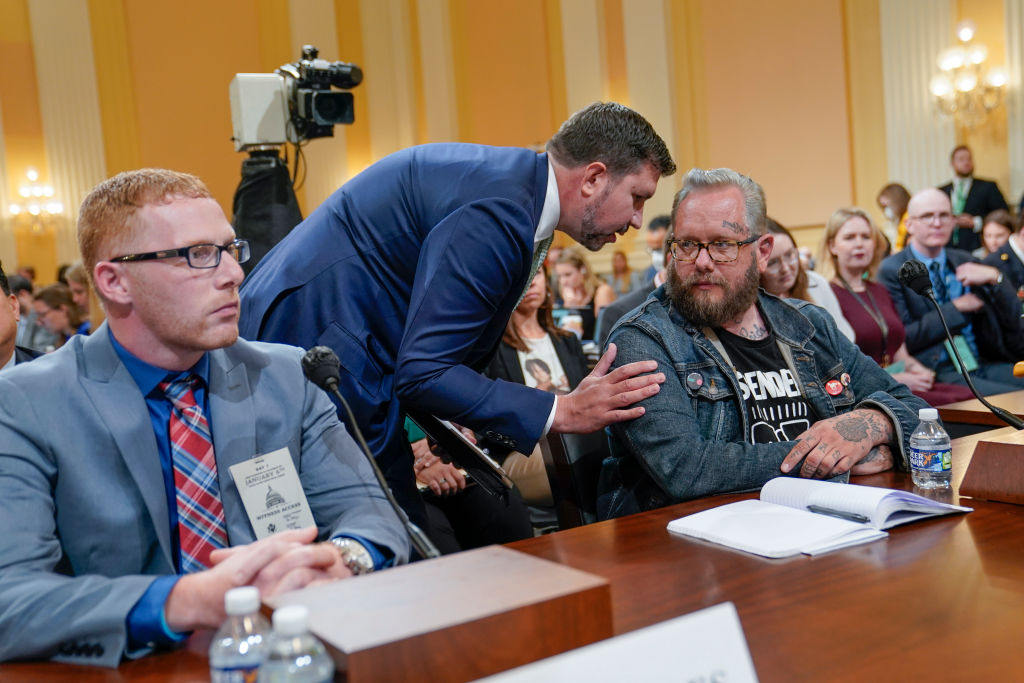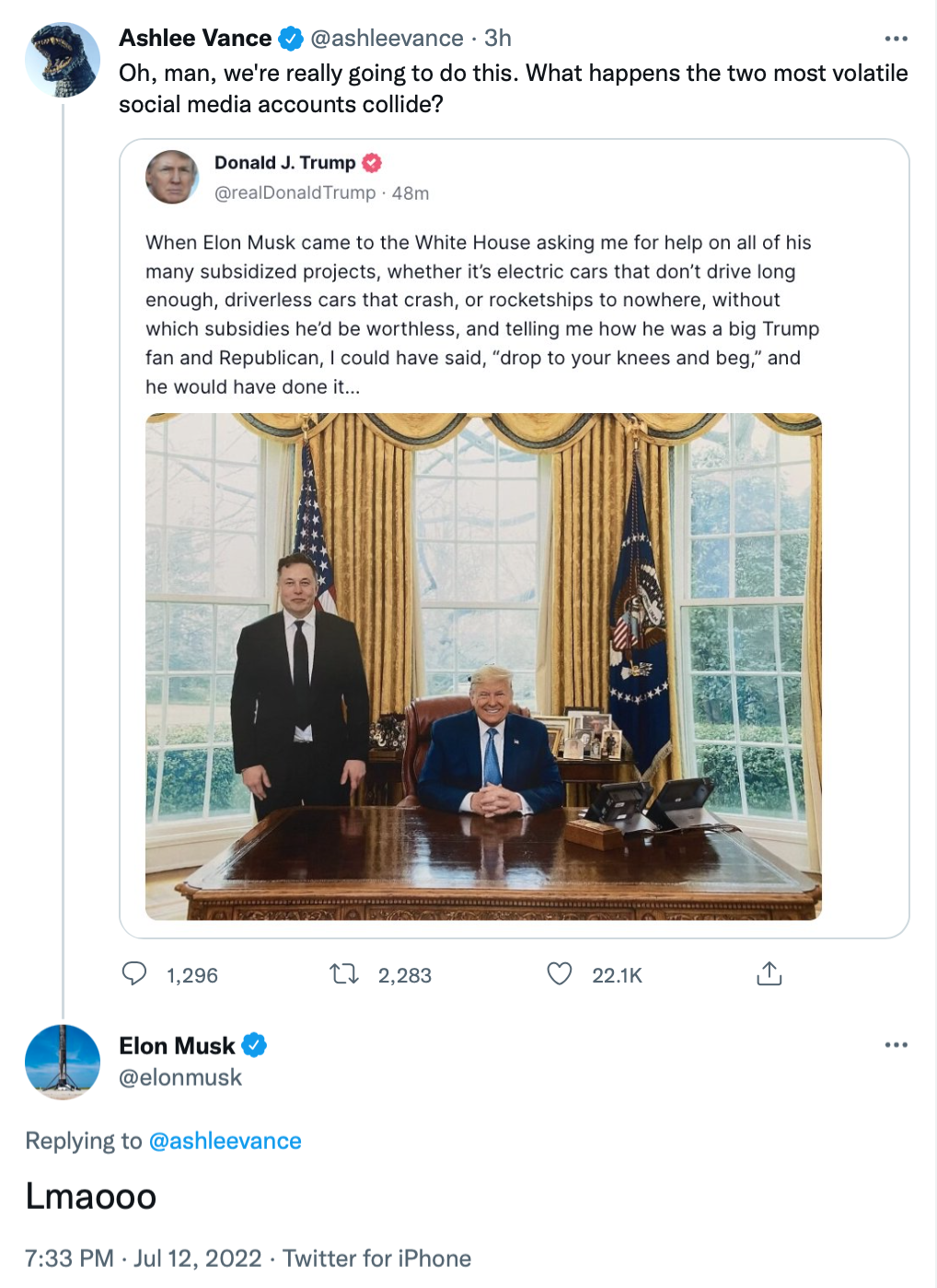The Morning Dispatch: January 6, Not So Spontaneous

Happy Wednesday! We’re glad the 23-year-old American tourist who fell into Mount Vesuvius trying to take a selfie is okay, and we hope he learned a valuable lesson.
Quick Hits: Today’s Top Stories
After being blocked from leaving the country at least twice on Monday, embattled Sri Lankan President Gotabaya Rajapaksa successfully fled to the Maldives yesterday, effectively ending the decades-long Rajapaksa family dynasty in the South Asian country of 22 million. Protesters frustrated with deteriorating economic conditions have occupied the presidential palace for days, and it’s unclear whether the public will accept the unity government currently being assembled.
U.S. Central Command announced yesterday the military conducted a drone strike in northwestern Syria on Tuesday, killing Maher al-Agal—the Islamic State’s highest-ranking official in Syria—and seriously injuring one of his associates. CENTCOM claimed the strike resulted in no civilian casualties, and President Joe Biden heralded the strike’s execution, saying it demonstrates the United States “does not require thousands of troops in combat missions to identify and eliminate threats to our country.”
The Senate voted 48-46 on Tuesday to confirm Steven Dettelbach as Director of the Bureau of Alcohol, Tobacco, Firearms, and Explosives, with Republican Sens. Rob Portman and Susan Collins joining all present Democrats in supporting the former federal prosecutor from Ohio. The ATF had been without a Senate-confirmed leader since 2015.
The Wall Street Journal reported Tuesday that U.S. Immigration and Customs Enforcement Acting Director Tae Johnson is preparing to issue a memo this week instructing immigration detention centers around the country that women in custody are entitled to abortions and should be transferred to another state if they are being detained somewhere the procedure is prohibited.
In a speech at the Pacific Islands Forum on Tuesday, Vice President Kamala Harris outlined several steps to counter China’s influence in the Pacific. The Biden administration plans to establish new embassies in Tonga and Kiribati, appoint a U.S. envoy to the Pacific Islands Forum, triple its request to Congress for regional economic development and ocean resilience funding, and release a more fleshed out U.S. strategy on the Pacific Islands.
The United States is launching a new, consolidated mental health crisis hotline on Saturday, when anyone experiencing mental health or emotional distress—as well as suicidal ideations—will be able to reach trained counselors by texting or calling 988. State health officials are reportedly concerned, however, that the hotline won’t have enough resources to keep up with expected demand when it launches.
Twitter sued Elon Musk on Tuesday over his recent attempt to back out of an agreement he signed in April to acquire the social media company for $44 billion. The case will be heard in the Delaware Court of Chancery, which will be tasked with determining whether Musk is responsible for “a long list of material contractual breaches” that have “cast a pall over Twitter and its business.”
January 6: Not So Spontaneous

For several hours on December 18, 2020, some of the greatest legal minds of a generation gathered at the White House for a meeting that would change the course of history. Sidney Powell was there, as were onetime national security adviser Michael Flynn and former Overstock CEO Patrick Byrne. Rudy Giuliani showed up, as did Mark Meadows. Shortly after it concluded, then-President Donald Trump sent a tweet.
“Statistically impossible to have lost the 2020 Election,” he wrote. “Big protest in D.C. on January 6th. Be there, will be wild!”
Those 20 words played a starring role in Tuesday’s January 6th Committee hearing, the seventh of the summer. Although yesterday’s festivities lacked the fireworks of Cassidy Hutchinson’s testimony two weeks ago—there was no mention of Trump throwing his food at the wall, for example—witnesses, texts, and emails presented by the committee Tuesday painted a picture of a president who knew he lost an election but nevertheless invited his followers to the nation’s capital and unleashed them on members of Congress.
“Donald Trump summoned a mob to Washington, D.C., and ultimately spurred that mob to wage a violent attack on our democracy,” committee chairman Rep. Bennie Thompson said in his opening remarks. And as demonstrated later in the hearing, even some of Trump’s own officials blamed the president’s rhetoric for the violence that ensued.
In the months since January 6, the former president’s allies have sought to downplay Trump’s role in amassing and directing the mob that stormed the Capitol, insisting the violence that occurred that day was unforeseen, a spontaneous overflowing of tempers. Sure, Trump called on his followers to “fight like hell” in his Ellipse speech, the argument goes, but he also said they’d be going to the Capitol to “peacefully and patriotically make your voices heard.”
But Tuesday’s hearing sought to demonstrate that very little that happened that day was an accident: Trump deliberately focused his extremist supporters on a specific date—January 6—and his public statements casting doubt on the election and suggesting it could be overturned motivated his followers to breach the Capitol. Former Trump supporter Stephen Ayres—who entered the Capitol that day, and has pleaded guilty to a misdemeanor charge of disorderly and disruptive conduct in a restricted building—testified as much on Tuesday.
The committee began the hearing with a focus on the unscheduled, six-hour White House meeting that took place on December 18, seeking to establish once again that Trump knew he’d lost the election, but was surrounding himself with increasingly extreme voices presenting extreme proposals to keep him in power. Two camps of Trump advisers emerged at that meeting, which Hutchinson described as uniquely “unhinged,” and the two devolved into several shouting matches over the course of the evening.
One group—consisting of Rudy Giuliani, Michael Flynn, and Sidney Powell—insisted Trump should keep fighting the results. “They were looking for avenues that would result in President Trump remaining President Trump for a second term,” said Derek Lyons, former White House staff secretary.
The second group pushed for evidence. Powell joked that White House counsel Pat Cipollone “set a land speed record” when he learned she was at the White House, and Cipollone testified behind closed doors last week that he demanded Giuliani and Powell produce proof for their fraud claims. Eric Herschmann—former Trump adviser and attorney—remembered in testimony shown Tuesday that Powell insisted judges who tossed the Trump team’s fraud claims for lack of evidence were corrupt. “Every one?” Herschmann remembered asking. “Even the ones we appointed?” He recalled Venezuelan vote tampering and internet-connected Nest thermostats somehow entering the discussion.
Despite a continued lack of evidence for the claims, Trump continued to live in a world where he did not lose to Joe Biden. And shortly after the meeting concluded, he sent the aforementioned tweet. The message helped focus the online chatter among his followers on a unified date to rally, according to social media posts the committee shared yesterday:
“Is the 6th D-Day? Is that why Trump wants everyone there?”
“It ‘will be wild’ means we need volunteers for the firing squad.”
“Trump just told us all to come armed. … This is happening.”
The Trump-supporting Women for America First group had planned a rally in D.C. closer to Biden’s inauguration, for example. But after Trump’s December tweet, the group’s leaders switched their rally permit to Jan. 6, according to an email the committee shared. “Wildprotest.com”—a website registered a few days after Trump’s tweet—gave eager supporters details of the Jan. 6 rally schedule and logistics.
Tuesday’s hearing also clearly established once again that Trump and his advisers fully expected a march on the Capitol after his speech at the Ellipse. “I will be making a Big Speech at 10AM on January 6th at the Ellipse,” read an unsent draft Trump tweet provided to the committee by the National Archives. “March to the Capitol after. Stop the Steal!!”
Rally organizer Kylie Kremer texted MyPillow founder and former Trump adviser Mike Lindell about the plan on January 4, the committee alleged. “This stays only between us,” Kremer warned. “POTUS is going to just call for it ‘unexpectedly.’”
Ali Alexander—another Stop the Steal organizer—also hinted at some level of coordination. “Tomorrow: Ellipse then U.S. capitol,” he messaged an unnamed journalist on January 5, committee members said. “Trump is supposed to order us to Capitol at the end of his speech but we will see.”
Even Trump-aligned members of Congress were worried the January 6th rally might turn ugly. “[We have] Trump supporters who actually believe that we are going to overturn the election,” Rep. Debbie Lesko of Arizona said the day before all hell broke loose, in audio shared by the committee. “When that doesn’t happen … they are going to go nuts.”
As Hutchinson testified last month, Trump was aware many of his supporters present on January 6th were bearing weapons of some kind—rifles, bear spray, baseball bats, etc.—and he called on them to head to the Capitol anyway. They obeyed, essentially operating under his command throughout the day. “The president got everybody riled up, told everyone to head on down,” Ayres testified Tuesday. “We basically were just following what he said.” When Trump eventually tweeted that the rioters should leave the Capitol, Ayres told the committee, “We literally left right after.”
The committee didn’t establish direct ties between Trump and extremist groups like the Proud Boys and Oath Keepers whose members have been charged with seditious conspiracy for their role in the January 6th attack—though they reminded viewers Tuesday that Trump adviser Mike Flynn does have such ties, and that some Oath Keepers even served as security for Flynn. But the committee is trying to establish that Trump criminally incited the rioters, and Tuesday’s evidence undercuts—at least somewhat—the argument that he couldn’t have been responsible because the violence was a spur-of-the-moment mob action.
That may be making Trump nervous. “After our last hearing, President Trump tried to call a witness in our investigation, a witness you have not yet seen in these hearings,” Rep. Liz Cheney alleged Tuesday. “That person declined to answer or respond to President Trump’s call and instead alerted their lawyer to the call. Their lawyer alerted us.” Trump spokesman Taylor Budowich denied the claim, but Cheney said the committee had passed the information on to the Department of Justice. If Trump attempted to influence testimony, that would constitute witness tampering.
Regardless of whether the committee proves Trump legally culpable for January 6, at least one top Trump adviser held him morally responsible for that day. After police shot and killed Trump supporter Ashli Babbitt as she attempted to breach the Capitol, Trump’s former campaign manager Brad Parscale texted Trump operative Katrina Pierson. “This is about Trump pushing for uncertainty in our country,” Parscale—who worked on both the 2016 and 2020 campaigns—wrote, in messages provided by the Committee. “A sitting president asking for civil war. This week I felt guilty for helping him win [in 2016].”
“You did what you felt right at the time and therefore it was right,” Pierson replied.
“Yeah,” Parscale wrote. “But a woman is dead.”
“You do realize this was going to happen,” Pierson said.
“Yeah,” Parscale said. “If I was Trump and knew my rhetoric killed someone.”
“It wasn’t the rhetoric.”
“Katrina. Yes it was.”
One month later, Parscale tweeted: “Statement to Trump: ‘If they only impeached you twice, you need to run again… I’m in, are you?’”
Worth Your Time
In the days after Dobbs was handed down, a tragic story began circulating the internet, of a 10-year-old rape victim in Ohio who had to travel to Indianapolis to terminate her pregnancy. President Joe Biden cited it when signing an executive order last week, and South Dakota Gov. Kristi Noem was asked about it on CNN. But there’s little evidence backing up the account. As Washington Post fact checker Glenn Kessler notes, the only source cited for the anecdote was Dr. Caitlan Bernard, an Indianapolis-based OB-GYN who claimed she received a call from a “child abuse doctor” in Ohio alerting her to the girl’s situation. “Bernard declined to identify to the Fact Checker her colleague or the city where the child was located,” Kessler writes. “‘Thank you for reaching out. I’m sorry, but I don’t have any information to share,’ she said in an email. … As a spot check, we contacted child services agencies in some of Ohio’s most populous cities, including Cleveland, Columbus, Cincinnati, Dayton and Toledo. None of the officials we reached were aware of such a case in their areas.” Speaking with Fox News, Ohio Attorney General Dave Yost said his office hasn’t heard “a whisper” of evidence to support the story. “Any case like this, you’re going to have a rape kit, you’re going to have biological evidence. There is no case request for analysis that looks anything like this,” he said. Yost also pointed out that such a girl could have qualified for a “medical emergency exception” under Ohio’s fetal heartbeat law. “This young girl, if she exists and if this horrible thing actually happened to her, breaks my heart to think about it. She did not have to leave Ohio to find treatment.”
It’s been a while since Congress and the White House have had to function in a world of high interest rates—and they’re not ready. “The latest CBO budget baseline conservatively assumes that the average interest rate on the federal debt rises to 3.1 percent over the decade, which is just 0.7 percent above what it projected last year before inflation and interest rates began growing,” Brian Riedl writes in National Review. “Even that modest forecast shows that, a decade from now, the $1.2 trillion cost of annual federal interest payments will exceed the defense budget, and represent a record 3.3 percent of the economy. And that is the rosy scenario of a strong economic recovery, low inflation, no new spending expansions, and the 2017 tax cuts expiring on schedule. And what if interest rates surpass the CBO’s projected 3.1 percent rate a decade from now? Each additional percentage point would cost the federal government $2.6 trillion over the decade, and $400 billion annually by 2032.”
Something Mesmerizing (Part II)
Presented Without Comment
Also Presented Without Comment
Also Also Presented Without Comment

Toeing the Company Line
Will Senate Minority Leader Mitch McConnell’s legislative ultimatum doom Build Back Better, the America Competes Act, or both? “Republicans won’t work on the bipartisan China competition bill as long as Democrats are working on their partisan budget reconciliation package,” Haley writes in Tuesday’s Uphill (🔒). “This has translated into a real logjam, with Senate Republicans canceling meetings and putting a hold on efforts to rectify differences with the House.”
In this week’s edition of The Sweep (🔒), Sarah touches on the gender gap among young voters, surprisingly competitive Senate races in Washington and Colorado, how little Democrats and Republicans know about each other, the real value in “bipartisan” endorsements, and the most important issue in the 2022 midterms. “Whenever anyone tries to tell you that this election will turn on abortion or guns or cancel culture or transgender athletes or literally anything else, here is my response: It’s still the economy, dumb-dumb.”
Tuesday’s French Press (🔒) deals with a predictable genre of article starting to crop up online, arguing Ron DeSantis would be a worse president than Donald Trump. “Donald Trump presents an existential threat to the continued existence of the United States as an intact republic,” David writes. “Our nation may not survive a second Trump term. Ron DeSantis has his flaws, but he’s absolutely within the bounds of a mainstream American politician.”
On the latest episode of The Remnant, Jonah was joined by former colleague Charles C. W. Cooke to discuss gun rights, criminal law, and electoral politics—plus a deep dive into linguistics prompted by Jill Biden’s taco gaffe, a discussion of America’s fondness for elderly political figures, and a consideration of the constitutionality of stop-and-frisk.
On last night’s Dispatch Live, David and Klon were joined by Paul Miller of Georgetown University for a discussion about Christianity, nationalism, and other themes Miller explores in his new book, The Religion of American Greatness. Dispatch members who missed the conversation or want to tune in again can access a video or audio recording by clicking here.
On the site today, Bill Wirtz discusses the likelihood of Emmanuel Macron’s new political coalition pulling him to the left in France, Jonah breaks down Biden’s spate of terrible polling and the reasons behind it, and Price St. Clair offers another account of yesterday’s January 6 hearing.
Let Us Know
Have you ever had a brush with injury or death trying to take a selfie, or for any similarly foolish reason?